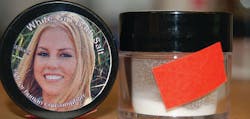Drug watch: Bath salt ban
Prescription drug abuse isn't the only rising trend to watch. Several pioneering drugs have task forces, the National Institute of Drug Abuse and the DEA concerned, including a new type of high, a synthetic drug trickily marketed as a specialty beauty product but authorities have found its usage is contrary to its packaging.
'High abuse and addiction liability'
Though the DEA states forms of the bath salt drugs have shown up in the United States for about two years, they've recently received much attention as a trend gaining ground in the recreational drug-use market. The salts contain MDPV and mephedrone, psychoactive drugs with stimulant properties, and are sold online and in specialty stores. Users snort or smoke the substance to produce a cocaine or meth-like high.
Earlier this year, the DEA put a temporary ban on the substance in order to buy time to develop enforcement and assess the problem.
Much like the street drugs bath salts are used to mimic, the ingestion of the salts poses risk. In a message on its website earlier this year, NIDA Director Dr. Nora Volkow writes that the addictive quality of bath salts ranks high, much like some street drugs that currently cause issue for doctors and law enforcement alike.
"Mephedrone is of particular concern because, according to the United Kingdom experience, it presents a high risk for overdose," Volkow notes. "These chemicals act in the brain like stimulant drugs (indeed they are sometimes touted as cocaine substitutes); thus they present a high abuse and addiction liability."
The difference between the street drug problem and the brimming bath salt problem is that for bath salts, like huffing, you don't necessarily need a dealer to procure the substance.
Information from a recent bust in New York says the bath salts typically sell for between $40 to $100 a gram. The Big Apple's Bath Salts Task Force found packets of the drug labeled with monikers such as Aura, Goodfellas, Ivory Wave, Russian River and Xtreme, to name a few.
Though the packages, which range in appearance but are often a circular or cylindrical container, are often marked "not for human consumption," (See image 1 below) the New York round up in June found nonetheless that sellers market "bath salts" as a recreational drug.
Move to classify salts under CSA
In a statement in April to the U.S. Senate on the dangers of the bath salt designer drugs, Joseph Rannazzisi, deputy assistant administrator for the DEA's Office of Diversion Control, wrote that the bath salts (also sold under the guise of plant food, he says) are a threat to human health and public safety, as evidenced throughout the nation in recent months. In addition, he says classifying the synthetic drugs marked as bath salts under Schedule I control of the Controlled Substances Act is necessary, detailing health risks and the rise in bath salt ingestion and related medical emergencies through the nation.
As of July, about 21 states including New York, Ohio, Pennsylvania, Virginia and Florida have bans against the so-called bath salt drugs.
